

 The South African
The South African
1939
All that the grownups seemed to talk about was 'The War'. I didn't like it and nor did my mum, who told my dad to talk about something else for a change. 'The War' hadn't even started when we were all given gas masks which came in a cardboard box. We were ordered to carry them with us at all times. The other boys and I put them on and chased each other in them, but the visor got all misted up, so we hid the gas masks and used the box instead to carry useful things like pen knives, bits of string and conkers. Then came the air raid shelters called Anderson Shelters. They were made of corrugated iron. My dad, and everybody else, had to dig a big hole in the garden and then sink this sort of iron hut into the hole and then throw the earth that had come out of the hole onto the roof. There must have been millions and millions of them all over England, but nobody used them because they filled up with water as soon as it rained. This water turned green with things in it.
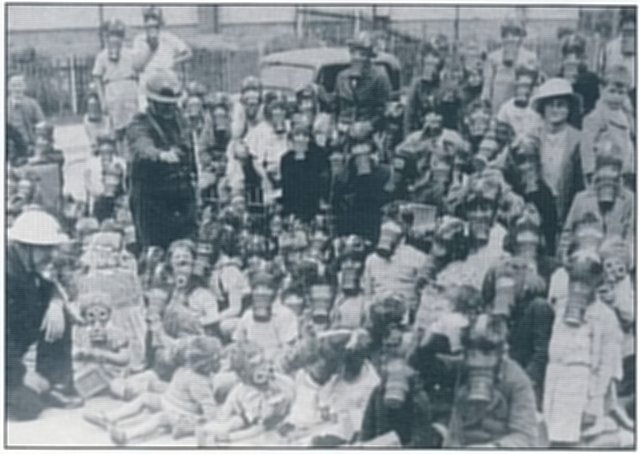
Early on in the War, all children were issued with gas masks
(Photo: By courtesy, R Lock).
The war still hadn't started, and I was not happy about who was in charge on our side. From the pictures I saw in my dad's newspaper, our leader was a cranky looking old man with an umbrella, while the German leader, whom you could see on the cinema news, was alvyays shouting, and saluting thousands and thousands of soldiers.
'It's war!'
Then, at last, war was declared, which meant the war had started. Nothing happened. But we had to be what was called 'evacuated'. We lived at Portsmouth, where there were lots of battleships and sailors. So, I, my mother and my brother and lots of other children were evacuated to the Isle of Wight, which seemed silly to me as we were now six miles closer to Germany! Still nothing happened. After two weeks, my mum wanted to go home, and we carried all our bags and cases back to the ferry again. I told my mum that there were lots of German submarines waiting, and she hit me.
Back home, everyone was busy blacking out every door and window in all the houses. This was done by either painting the windows with black paint (which was silly as in the daytime you couldn't see inside), or by hanging up thick black curtains. There was a thing called ARP, which stood for Air Raid Precautions, run by a lot of bossy old men called Air Raid Wardens, who were too old for the army. As soon as it got dark, they used to go around shouting 'Put that light out!'. We used to get a stub of candle, light it and put it outside somebody's blacked out window. We got into trouble for that. All the street lights had gone, so it was really dark and scary.
Then there was rationing. Every time I asked mum for something to eat, she would say: 'I've told you before, that's on ration. You'll have to make do.' I loved bananas and if I behaved myself I used to get one once a week. But now bananas were 'out of bounds', as my dad put it, and I didn't get another banana for six years!
As a Boy Scout, I got stuck into the 'War Effort'. Almost every boy for miles around had a 'cart', a vehicle made from an old orange box (we didn't get any oranges either!), four discarded pram wheels, and a bit of rope to steer. In peacetime, we used to scream along the pavement, four boys pushing and one in the box, steering. All the old ladies said they were going to report us to the police. But now, we Boy Scouts went from house to house, knocking, pretty hard, on the front doors, asking for old aluminium pots and pans to make into Spitfires.
I got mad keen on aeroplanes and got awarded the Air Spotter's Badge to add to the other badges on my Scout shirt. Not only that, my scout master told me I was the first boy in the whole of England to get this badge, which was not easy to get, I can tell you. You had to keep a diary for three months of every aeroplane you saw in the sky, write down what make it was, which direction it was going, and other things. Anyway, I got this badge and I knew a thing or two about what aeroplanes looked like. So, when I was out shopping with my mum one Saturday morning (I hated it, so must have done something wrong to earn that!), I heard the sound of lots of aeroplanes flying low. People were peering up at the sky, including me and my mum, when I shouted 'They're Junkers! They're Junkers!'. My mum didn't know what Junkers were. 'They're Germans! They're Germans!' I shouted, making mum embarrassed; then the Junkers started dropping bombs. The Air Raid Warning siren had not been sounded and the next moment mum and I were blown through a shop doorway and covered in glass. Then the siren sounded. It was the first raid of the war on Portsmouth. I heard that there was a lot of damage inside the Naval Dockyard, but bombs were also dropped outside, one on Lake Road, where my mum and I and the Prince's Theatre were. The theatre was full of kids enjoying the Saturday morning matinee, all screaming and shouting at the antics of Laurel and Hardy. The bomb took off most of the roof, and lots of kids were injured, but none killed. Mum hurried me home, as though it would be safer there, and I kept saying, 'I told you they were Junkers! I told you they were Junkers!'
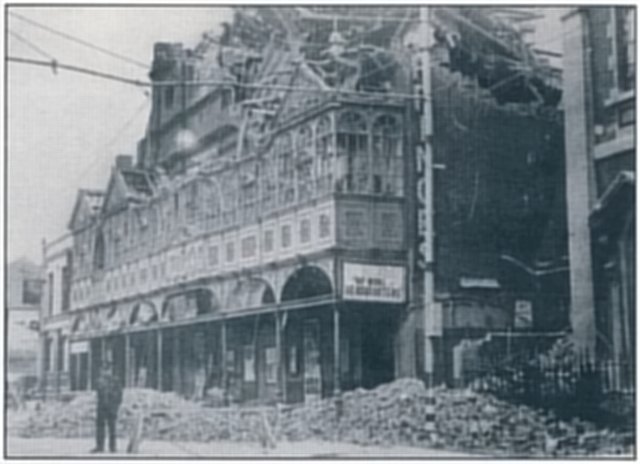
The Prince's Theatre, after the Saturday morning raid.
(Photo: By courtesy, R Lock).
Later, we Boy Scouts, with our keen eyes and knowledge of aeroplanes, were attached to the ARP post, so that if we saw enemy planes, we could run to the ARP and tell them because it was only by seeing them that you could know they were there. We were called 'messenger boys' and got an official green identity card which I showed to other boys who wished they had one.
Air Raids
'Well', everyone said then, 'It's started all right', meaning the war had started. Now there were many more air raid precautions: barrage balloons and more air raid shelters. These were built down side streets, of brick, straight onto the road surface. Each one was for about fifty people and called a 'Street Shelter'. About this time, people were still singing songs about hanging out their washing on the Siegfried Line and about there always being an England. But then there was no more singing, except on the wireless, and you could tell something was wrong. Everyone seemed to be going on about a place called Dunkirk, and how our army had been rescued by a lot of little boats. I heard from another boy that some of these rescued soldiers were being put into Hillsea Barracks, so my brother and I went to take a look. These soldiers were not smart looking. Instead, they looked tired and half dressed, but most grinned and gave us the 'V' for Victory sign. My dad said, 'Now we're in for it!'
He was right. Now the Germans were just across the channel, less than a hundred miles away. They came every night, at about six o'clock in the evening, just after my dad got home from work. Mum made us put on warm clothes, get a blanket, a torch and hurry across the street to the street shelter. It was just brick walls inside with a woqden bench on either wall to sit on. At the end wall there were two bucket lavatories. They didn't have doors, only a sacking drop to close you off from the other people inside and they smelt of horrible chemicals and nobody wanted to use them. It was all very dark and frightening. The only light was a dim bulb in the middle of the concrete ceiling which went out as soon as the bombs were dropped, leaving us all in the pitch dark. That's why we brought torches. The wooden benches were very hard and hurt your bottom, but there was nowhere else to sit. Some people went home and said they would rather die in the comfort of their bed than stay in the shelter all night, but they soon came back when the bombs started dropping again.
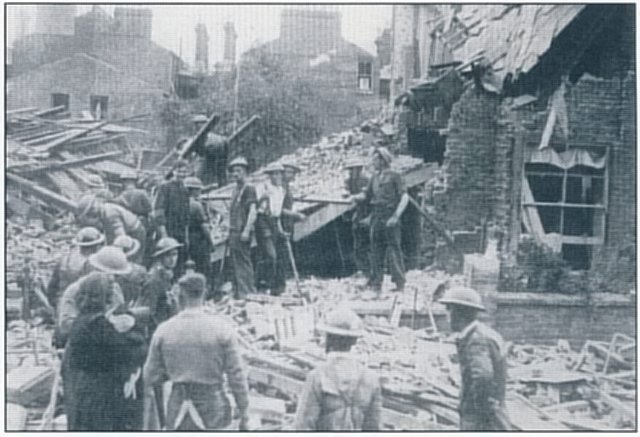
Few streets in the city escaped the attention of the Luftwaffe.
(Photo: By courtesy, R Lock).
Our shelter was opposite Kingston Cemetery, which had a big turning circle in front of its gates. Every night before dark, a big mobile Anti-Aircraft gun parked in the circle and, as soon as an aeroplane got caught in the searchlights, the gun started banging away. It made a shocking noise and its 'BANG' blew all sorts of dust and rubbish through the doorway all over us. Then, when the bombs dropped, and there were lots of them, they blew up houses just down the street. They also dropped firebombs, thousands and thousands of them and lots of them went straight through the roofs and set fire to everything. They had an awful stink because of what they had inside that set fire to everything. We had one right through the roof of our house while we were in the shelter. It burned a hole in our bedroom floor, and some of the furniture got burnt, but a fire engine put it out before the fire really got going. My mum cried about the furniture.
The high explosive bombs smashed down rows of houses and left a hole 'so big you could have put the Guild Hall inside it', my dad said. Some bombs weren't bombs at all, but enormous 'land mines' that came down by parachute. They were the worst. What the Germans did was to come over at about eight o'clock, drop bombs for about half an hour, fly back across the channel, load up with more bombs and come back again at about midnight. The 'All Clear' would sound in between, allowing the men to go out, see what had happened, make a flask of tea, and get back in again. When the bombs started dropping again, when the anti-aircraft guns started banging away, when the lights went out and the noise seemed to explode right inside your head, I would get down on the floor where it seemed safer. I was pretty terrified of it all, but not as terrified as I was of my mother's terror. Mum had asthma and, with all the noise and stuff, she gasped and gasped for breath, and I was sure she was going to die, and so was my brother.
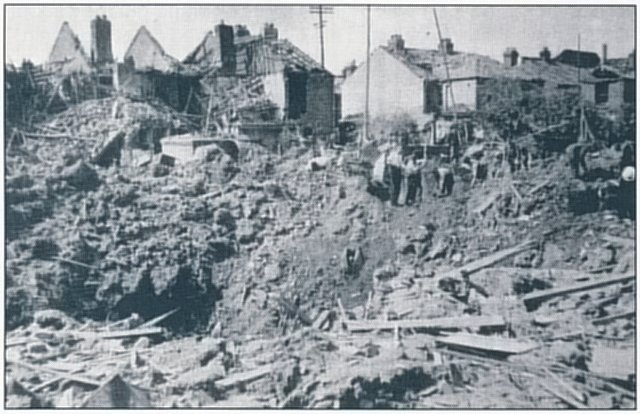
A gigantic hole left by a parachute landmine.
(Photo: By courtesy, R Lock).
But there was a brighter side to the war. Instead of us collecting the usual - and every boy collected something or other, foreign stamps, bird's eggs, or dead butterflies - we all started collecting cap badges, tunic buttons, cigarette cards about the war and, most prized of all, shrapnel. After every raid, shrapnel was littered allover the place. Most valuable were bits of anti-aircraft shells with copper numbering on them, followed by the fins of incendiary bombs; the value of bomb shrapnel depended on size. My brother and I were fortunate in living opposite the cemetery where we could scout around along the paths picking up bits of shrapnel without any competition. Of course, lots of bombs fell in the cemetery, but we stayed away from those bomb craters for fear of what might be in them. However, my brother and I talked about what we would do if we found a complete skull. We could not estimate what its value would be in terms of swaps for cigarette cards, cap badges and shrapnel, but we knew we would be in trouble with mum if we brought one home. Anyway, we never did find one.
Evacuation
Then came the worst raid of all. It was in the winter and bitterly cold. It was an incendiary raid, with just firebombs that set fire to the whole city! During the lull when the bombers had gone back for more bombs, my dad allowed my brother and lout of the shelter to see a sight, he told mum, we would never forget. It was like daylight, but as if everything was lit with billions of candles. The whole city was on fire. It was the worst raid of the war on Portsmouth, and lots of people were killed or wounded. So that was that, and we were off on 'evacuation' again. My dad and Uncle Bill went off one Sunday to find somewhere to go, and, within a couple of days, we were off to Bognor in Sussex, just twenty miles along the coast, but not so easy to get to. My dad had to leave at half-past four in the morning to get to work at seven. Then came the great news! All the Bognor schools were closed and for my birthday I was given a bike. It was a very old secondhand bike, but within a short time I was an expert on the byways and lanes of Sussex. All the road and street signs had been removed so that if the Germans landed, they would not know where they were, so to begin with, I didn't know either. But I soon found my way to Tangmere Aerodrome, where I could sit outside the barbed wire and see the Spitfires take off with a shattering roar. And then there were the 'dog fights' almost every day. Up on the Downs, you could see for miles, and watch the dog fights between our Spitfires and their Messerschmitts, leaving snow-white trails of vapour, like great scribbles of chalk across the sky as they tried to shoot each other down. You could often hear the rattle of their machine guns, and sometimes see a man in a parachute coming down.
One day, my mum gave me terrible news. Dad had found a school for me. Oh no! It was a school from London that had been evacuated with all its children, not many, about fifty, together with three teachers and the headmaster, Mister Gray. They had taken over what had been a sports club before the war. It was very nice, not like my old school in Portsmouth. One day Mr Gray called everybody into the hall. He had a big soldier with him who looked very smart. They both stood on the stage, and after Mr Gray had stopped talking and making a fuss, this soldier, who was an officer, spoke. He said he and his men were Canadians who, like us boys, were far from home. As it was close to Christmas, he and his men had decided to give us a party. We weren't half excited! We were all taken in an army truck to some army place and as we were marched in, in single file, we each took the hand of a soldier and went and sat at this big table which was full of food. There weren't any bananas, but lots of other spiffing stuff. My soldier's name was John and he looked young to be a soldier. He was very nice and he and his friend told me and another boy that if we came to their billet they would find some cap badges for us.
You couldn't get on the beach at Bognor, because of the rows and rows of barbed wire. The houses that used to front the beach were also barricaded with barbed wire. This is where the soldiers lived. This other boy and I used to go down to their billet on our bikes and if John and his friend were in, the guard would let us through and they would give us food, badges or shoulder flashes and let us work the bolts on their rifles in and out. We went there often. Then one day the guard would not let us in, and the next day the wireless was going on and on about the British landing at a place called Dieppe. It wasn't very good news; we'd been beaten. After this, when we used to go down to the billet, the soldiers were different and had different badges. I asked for John, but no one had ever heard of him.
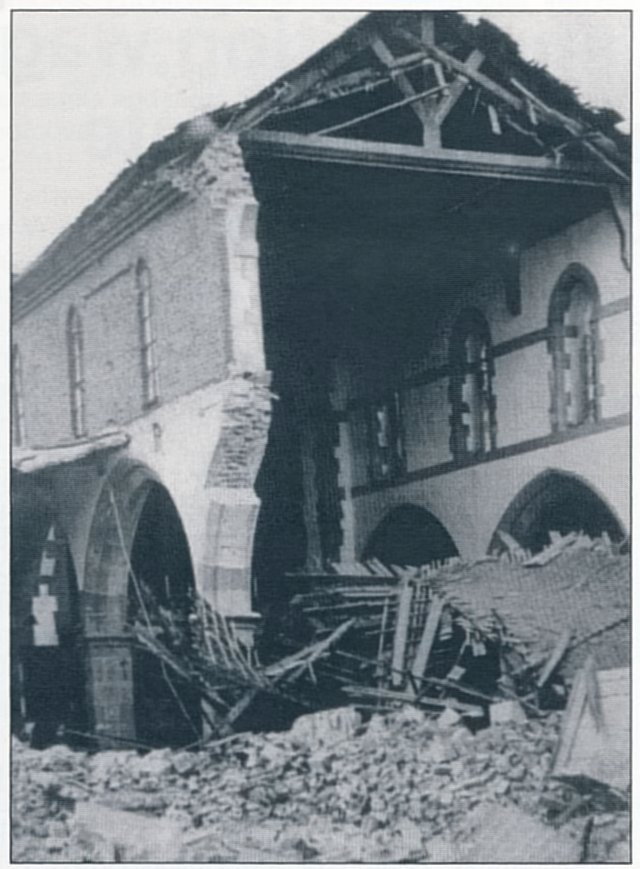
St Alban's Church, after being hit by a Messerschmitt 110 lone raider.
(Photo: By courtesy, R Lock).
The return home
More and more troops arrived. They seemed to be everywhere. Lorries, tanks, trucks and marching soldiers. There were also Americans, who gave us chewing gum, and stuff called Coke, and used to ask, 'Say kid, what's your sister's name?' They didn't know I didn't have a sister. Then, all of a sudden, Sussex seemed empty. They had all gone to Germany for 'D-Day' and it wasn't long before we were gone too, back to bombed-out Portsmouth and all the rubble. That's about it! There was the odd air raid siren but now everyone stayed in bed.
There was one last bit of excitement. One sunny Sunday evening, my dad sent me up to the corner shop to buy some Woodbines. I was hardly out of the door, when I saw a Messerschmitt 110, all on its own, cruising along as though minding its own business, when it dropped a bomb, just one bomb and, as if by accident, it hit St Alban's Church, just across the road, blowing it apart and wounding lots of people. I think the pilot had lost his way. Anyway, he was shot down by anti-aircraft guns. And that's about it. We won.
The Stricken City
Portsmouth is, in fact, an island, approximately four miles long and two wide, joined to the mainland by road and rail bridges. Between July 1940 and May 1944, 1 581 air raid alerts were sounded, 1 320 high explosive and 38 000 incendiary bombs were dropped on the city, as were 38 parachute land mines. Nine hundred and thirty civilians were killed and 2 837 injured, excluding an unknown number of service personnel. (Smitten City, 1981, p5).
The Dieppe Raid, August 1942
The Germans were forewarned and the raid itself was a disaster. Nevertheless, valuable lessons were learnt, which would ensure the success of the 'D-Day' landings two years later. The attacking force was close to 100 percent Canadian. Of the 4963 Canadian soldiers who took part in the raid, only 2120 returned, many badly wounded. (Greeham and Mace, 2012, p147).
Bibliography
Return to Journal Index OR Society's Home page
South African Military History Society / scribe@samilitaryhistory.org